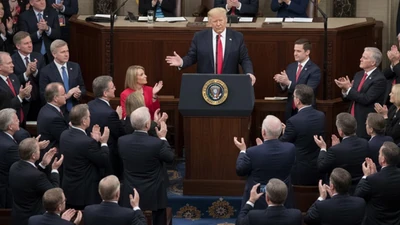Positioning Capital in a Deregulated, America-First Economy
President Trump’s return to office has brought a renewed focus on deregulation, economic expansion, and America-first trade policy—transforming the environment for investors who prioritize national strength, free enterprise, and long-term value. For conservative investors, understanding how these policies intersect with markets is essential for navigating risks and capitalizing on emerging opportunities.
Deregulation Opens the Door for Growth
Industries long burdened by restrictive regulations—particularly energy, manufacturing, and finance—are seeing renewed optimism. Trump’s deregulatory agenda is cutting bureaucratic red tape and lifting constraints that previously slowed business expansion. For investors, this signals a resurgence in sectors like fossil fuels, industrial production, and domestic infrastructure. As compliance costs fall and productivity rises, companies in these areas are better positioned to deliver shareholder value.
Environmental and labor regulations that once deterred capital investment are now being reassessed, encouraging both private sector growth and public market performance. The result: a more agile business environment where conservative investors can favor companies with leaner regulatory obligations and stronger margins.
Trade Realignment Creates Strategic Openings
While deregulation boosts domestic industries, protectionist trade policies introduce new complexity. Tariffs and strategic trade negotiations are reshaping global supply chains, particularly for companies dependent on foreign materials or overseas manufacturing. These policies are designed to bring jobs and manufacturing back to American soil—but they also require businesses to adapt swiftly to shifting costs and sourcing challenges.
For investors, this is a time to focus on companies with resilient domestic supply chains, limited foreign exposure, or the flexibility to pivot operations. Those firms are most likely to thrive under evolving trade dynamics. Conservative portfolios should emphasize U.S.-centric manufacturers and suppliers who benefit from reshoring trends and America-first trade enforcement.
The Fed, Free Markets, and Economic Expansion
Trump’s economic playbook also leans into tax relief and pro-growth measures—policies that could directly influence inflation, interest rates, and broader market momentum. As the administration seeks to expand economic output, the Federal Reserve will be forced to recalibrate, especially in its interest rate strategy.
For conservative investors, this environment underscores the importance of positioning around monetary trends. Financials—particularly regional banks—often benefit from rising rates. Dividend-paying equities and inflation-resistant sectors like real estate, energy, and commodities may also outperform. The focus should remain on anticipating macroeconomic shifts rather than reacting to market noise.
Smart Capital Allocation in the Trump Economy
This isn’t a time for passive investing. It’s a time for principle-aligned, strategy-driven decision making. The Trump administration’s regulatory rollback, protectionist trade stance, and inflation-sensitive economic policies require investors to be selective and forward-thinking. The path forward favors companies that are nimble, domestic-focused, and prepared to thrive under a pro-business government.
By aligning portfolios with America’s changing economic framework, principled investors can not only protect their capital—but also advance it in ways that reflect their values and long-term goals.










